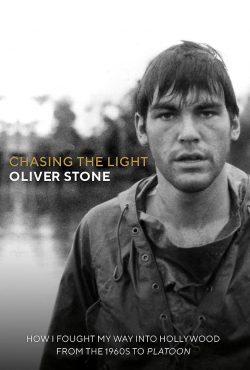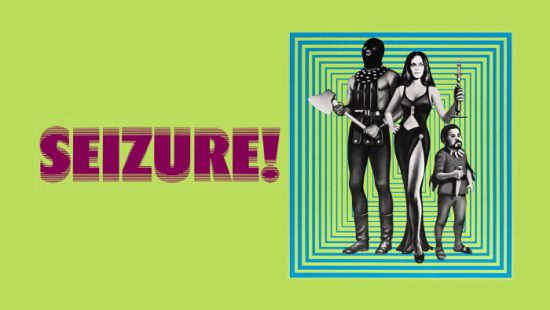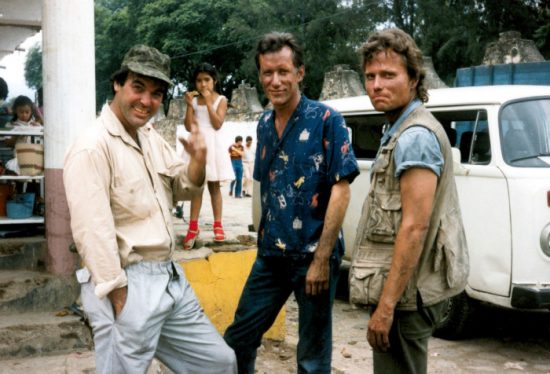Book Review: Chasing the Light by Oliver Stone
 Chasing the Light is Oliver Stone’s first memoir—but probably not his last, given that it ends at the Oscar party for his win of best director/best film for Platoon. Stone’s Facebook page has had various promotional blurbs from his contemporaries, and Paul Schrader’s sums up the book very well “Oliver Stone’s story is the story of my generation writ large.” It’s a relatively wild life story, and this is the just the first 40 years, wait till he gets to the ’90s…
Chasing the Light is Oliver Stone’s first memoir—but probably not his last, given that it ends at the Oscar party for his win of best director/best film for Platoon. Stone’s Facebook page has had various promotional blurbs from his contemporaries, and Paul Schrader’s sums up the book very well “Oliver Stone’s story is the story of my generation writ large.” It’s a relatively wild life story, and this is the just the first 40 years, wait till he gets to the ’90s…
Stone’s life from childhood to his biggest successes encapsulates all the changes that went on during the era of the boomers. He was conceived in an almost stereotypical wartime romance, his father a relatively well-off Eisenhower Republican stockbroker and his mother a more liberal-minded French woman. (Stone goes into great detail about how sexy his mom was-he most certainly had a Oedipus complex.) He got into Yale but deferred entry for a year to go teach in Vietnam just as America was ramping up the war. He came back, but was lost as to what to do: he tried returning to Yale, but dropped out again. Stone was in the same Yale class as George W. Bush (later one of his film subjects), and at his low point as a student wrote a rambling novel that got rejected. He was at that point that all young men have to go through, when they “kill their father” and become their own man, just like that moment in The Doors song “The End” (Stone would go on to make The Doors film, and he references Jim Morrison a lot in the book). There is an absolutely hilarious story in the book about Stone spiking his father’s scotch with LSD. Stone would finally sign up to serve in Vietnam, and requested combat duty. So yes, like his avatar in Platoon, “he volunteered for this shit.”
Vietnam was understandably the defining moment for Stone, as it was for so many in his generation. It radicalised him to some extent, although he admits voting for Reagan in 1980 (and regrets it), introduced him to drugs, and meant serving alongside working-class people, including for the first time Blacks and Latinos. This experience deeply altered his worldview, supporting a transformation from an all-American Republican to a stoned young man who was trying to find himself.
He was a film fan, and when he returned Stateside a friend suggested the NYU Film School and he was like: you can get a degree watching movies? Stone was lucky since he got there at the point when Martin Scorsese was one of the professors. This was post-Who’s That Knocking at My Door but pre-Boxcar Bertha/Mean Streets, so Marty was basically a massive film fan dreaming of making films and tinkering around in the experimental/early independent film world of late ’60s/70s New York while teaching to make ends meet. Scorsese would bring in people like John Cassavetes in to speak to students, and he was also the first person who saw that Stone had talent as a filmmaker when he saw his short, Last Year in Viet Nam. This was the boost Stone needed at that point in his life.
It’s mainly a book about Stone’s struggles with trying to get films off the ground, either as a screenwriter or director, starting in the early ’70s. He did write and direct a bizarro horror film called Seizure with Hervé Villechaize and Mary Woronov—yes, you read that correctly. It’s a pretty awful movie, but still a fascinating curiosity. His big break came when he stumbled upon the story of Billy Hayes in the memoir Midnight Express, an American caught smuggling hashish and banged up in a hellhole of a Turkish prison. That film took him from obscurity to winning an Oscar and put him back into the world of success and privilege he had come from to some extent.
It’s worth noting that in the meantime he was busy writing scripts, including a film based on the Patty Hearst kidnapping entitled The Cover-Up, which sounds like a fascinating conspiracy-led take, and was a real turning point in his writing and political evolution. Still, it wasn’t till he met Richard Boyle, the Hunter S. Thompson type who was the basis for Salvador, that Stone fully transformed into the leftist firebrand director he is known as today.
Stone himself had been busted for drug smuggling, having been caught with some hash when he came back from a short trip to Mexico. He had crossed the border from the States for some R and R after returning from his last tour in Vietnam, but those pesky Border Cops were observant. He was facing up to 20 years, but daddy was well-connected enough that he walked. He obviously empathized with Hayes’ plight. Although Midnight Express was a very good film, it is a heavily fictionalised account of the Hayes story, partly due to Hayes himself being unwilling to delve into certain details (i.e., he smuggled far more hash then he let on). Stone also saw it as his one last gamble as a screenwriter, so he added some Hollywood flourishes, including Hayes killing a guard in his escape.
Midnight Express was both the best and worst thing that could’ve happened to Stone, he would go on to win the Oscar for a best-adapted screenplay, but with its success, Stone got a love for the yayo. His first marriage was on its last legs, and while he was desired by the studios, he was being cocky—he was always desperate to make script he wrote called Platoon. The years in between are well covered, including the complex and hellish story of making Salvador. For that project, the money wasn’t really there, and Stone dedicates the book to John Daly, the British producer whose efforts saved the project and his career. He also gets his meeting with Ron Kovacs, which led to planning to make Born on the Fourth July with Al Pacino in the lead role. Pacino left that project but later on Stone would write Scarface which was project Pacino originated after seeing a revival screening. Stone writes the script, which was meant to be made by Sidney Lumet. Lumet brought in the political angle, but didn’t like Stone’s script so then Brian De Palma was brought in, who made it into this grand opera.
There are plenty of great moments documented along the way, such as the story about how Stone’s Golden Globes acceptance speech opposing incarceration of low-level drug offenders was received. There’s also The Hand, an odd studio film he made with Michael Caine. Stone was still doing pulpy genre stuff at that point, and here he directed Caine as a cartoonist with an errant hand that kills people…Lots of his films continue to have genre elements—JFK , of course, is a conspiracy thriller but only U-Turn and Savages also hearken back to that era of his career. He is however shamefully dismissive of 8 Million Ways to Die, a neo-noir that Hal Ashby directed based on a script he wrote that although flawed has some excellent sequences.
Overall, the book is well-written (annoyingly, there are some typos, depressingly common with first printings these days) and tells an interesting first-person story from a director who has had an interesting life. The Vietnam section was less interesting than I had hoped, but he has done the film about it, so maybe didn’t want to revisit it as much as other aspects? There’s some of the standard film-business gossip, but for the most part, it moves the story forward effectively. There are some surprises, including adding fuel to rumour that Michael Cimino was either cross-dressing or transitioning towards the end of his life. And Al Pacino emerges as being as straight-laced as he can be—which surprised Stone as much as it might you. Much like in David Lynch’s own recent memoir Oliver Stone goes into detail about how had the serious hots for Elizabeth Taylor at the 1987 Oscars, both directors got smooches off the old Dame that night.
The book climaxes with Platoon, which was perhaps the easiest film he had made up to that point. He goes into the common issues with actors and money, but when they got the cast and made it to the Philippines, it was far less of a hassle than all of the insanity that happened during Salvador. The ending is a great depiction of what it’s like when you’ve “made it”—he’s getting all these crazy offers from the most famous people on the planet, but decides to do Wall Street… It all leaves you waiting for Volume 2—which is sure to show up eventually.

Originally posted here. You can follow me on Twitter.











